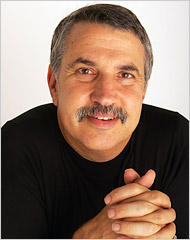Tom Friedman: Some things are true even if George Bush believes them
 What would have happened if Larry and Sergey needed today a loan for a new product named just like that: Google?
What would have happened if Larry and Sergey needed today a loan for a new product named just like that: Google?Tom Friedman in today's NY Times:
The hardest thing about analyzing the Bush administration is this: Some things are true even if George Bush believes them.
Therefore, sifting through all his steps and missteps, at home and abroad, and trying to sort out what is crazy and what might actually be true — even though George Bush believes it — presents an enormous challenge, particularly amid this economic crisis.
I felt that very strongly when listening to President Bush and Treasury Secretary Hank Paulson announce that the government was going to become a significant shareholder in the country’s major banks. Both Bush and Paulson were visibly reluctant to be taking this step. It would be easy to scoff at them and say: What do you expect from a couple of capitalists who hate any kind of government intervention in the market?
But we should reflect on their reluctance. There may be an important message in their grimaces. The government had to step in and shore up the balance sheets of our major banks. But the question I am asking myself, and I think Paulson and Bush were asking themselves, is this: What will this government intervention do to the risk-taking that is at the heart of capitalism?
There is a fine line between risk-taking and recklessness. Risk-taking drives innovation; recklessness drives over a cliff. In recent years, we had way too much of the latter. We are paying a huge price for that, and we need a correction. But how do we do that without becoming so risk-averse that start-ups and emerging economies can’t get capital because banks with the government as a shareholder become exceedingly cautious.
Let’s imagine this scene: You are the president of one of these banks in which the government has taken a position. One day two young Stanford grads walk in your door. One is named Larry, and the other is named Sergey. They each are wearing jeans and a T-shirt. They tell you that they have this thing called a search engine, and they are naming it — get this — Google. They tell you to type in any word in this box on a computer screen and — get this — hit a button labeled I’m Feeling Lucky. Up comes a bunch of Web sites related to that word. Their start-up, which they are operating out of their dorm room, has exhausted its venture capital. They need a loan.
What are you going to say to Larry and Sergey as the president of the bank? Boys, this is very interesting. But I have the U.S. Treasury as my biggest shareholder today, and if you think I’m going to put money into something called ‘Google,’ with a key called ‘I’m Feeling Lucky,’ you’re fresh outta luck. Can you imagine me explaining that to a Congressional committee if you guys go bust?
And then what happens if the next day the congressman from Palo Alto, who happens to be on the House banking committee, calls you, the bank president, and says: I understand you turned down my boys, Larry and Sergey. Maybe you haven’t been told, but I am one of your shareholders — and right now, I’m not feeling very lucky. You get my drift?
Maybe nothing like this will ever happen. Maybe it’s just my imagination. But maybe not ...
Government bailouts and guarantees, while at times needed, always come with unintended consequences, notes the financial strategist David Smick. The winners: the strong, the big, the established, the domestic and the safe — the folks who, relatively speaking, don’t need the money. The losers: the new, the small, the foreign and the risky — emerging markets, entrepreneurs and small businesses not politically connected. After all, what banker in a Capitol Hill hearing now would want to defend a loan to an emerging market? Yet emerging economies are the big markets for American exports.
Don’t get me wrong. I am not criticizing the decision to shore up the banks. And we must prevent a repeat of the reckless bundling and securitizing of mortgages, and excessive leveraging, that started this mess. We need better regulation. But most of all, we need better management.
The banks that are surviving the best today, the ones that are buying others and not being bought — like JPMorgan Chase or Banco Santander, based in Spain — are not surviving because they were better regulated than the banks across the street but because they were better run. Their leaders were more vigilant about their risk exposure than any regulator required them to be.
Bottom line: We must not overshoot in regulating the markets just because they overshot in their risk-taking. That’s what markets do. We need to fix capitalism, not install socialism. Because, ultimately, we can’t bail our way out of this crisis. We can only grow our way out — with more innovation and entrepreneurship, which create new businesses and better jobs.
So let’s keep our eyes on the prize. Save the system, install smart regulations and get the government out of the banking business as soon as possible so that the surviving banks can freely and unabashedly get back into their business: risk-taking without recklessness.
(Zoon Politikon)
Labels: Tom Friedman

0 Comments:
Post a Comment
<< Home